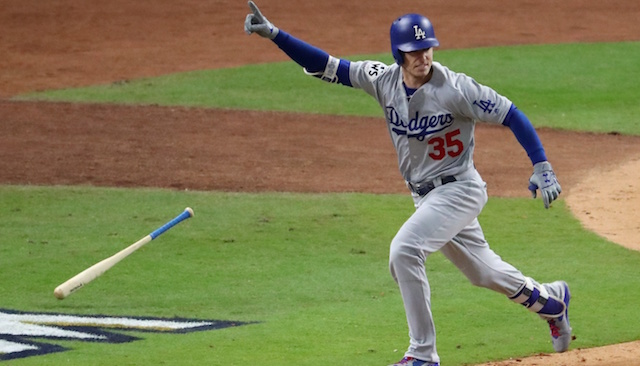Going into the 2017 season the top prospect in the Los Angeles Dodgers organization was first baseman Cody Bellinger. The then-21-year-old was not expected to contribute much in 2017, as many thought he would be a September call-up.
But things changed rather quickly as first baseman Adrian Gonzalez dealt with nagging injuries, and Bellinger joined the Dodgers for his MLB debut on April 25. However, he received a call-up because of injuries in the outfield.
Thus, Bellinger’s time in the Majors was expected to be relatively brief. But not only did Bellinger prove that he belonged, but he swung the bat so well that Dodgers manager Dave Roberts had no choice but to put him in the lineup every day.
Bellinger returning to Triple-A Oklahoma City quickly became an afterthought. He slugged his way through the first half of the season — to the tune of .261/.342/.619 with 25 home runs and 58 RBIs — and it culminated with a selection to the All-Star Game.
The rookie sensation hit 24 home runs in just 57 career games, becoming the fastest player to reach that milestone in the history of Major League Baseball.
He competed in the Home Run Derby during All-Star week in Miami, and with his dad Clay pitching to him, defeated Charlie Blackmon in the first round before losing to Aaron Judge in the second round.
Bellinger began the second half with a bang, as he hit for the cycle on July 15 against the Miami Marlins, becoming just the ninth player in franchise history to accomplish the feat.
He carried that momentum all the way through the end of the season, as Bellinger hit .267/.352/.581 with 39 home runs, 97 RBIs, 87 runs scored and even showed his athleticism by stealing 10 bases in 13 attempts.
His 39 home runs were the most ever by an NL rookie, and Bellinger became the second straight Dodger to win a unanimous NL Rookie of the Year Award, following in Corey Seager’s footsteps.
In addition to his strong offensive production, Bellinger also demonstrated tremendous versatility on the defensive side of the ball. He played all three outfield positions at an above-average level, while also manning his natural first base position at a Gold Glove-caliber level.
Bellinger played a big part in the Dodgers postseason success, as although he batted just .219/.254/.453 while striking out 29 times, he did hit three home runs and drove in nine runs in 15 games.
2017 Highlight:
Every player remembers their first Major League home run, and Bellinger will certainly remember his as he hit his first and second on the same day.
On April 29 against the Philadelphia Phillies, Bellinger stepped to the plate with the Dodgers trailing 4-1 in the bottom of the seventh inning. He launched a deep home run to right field off Phillies starter Zach Eflin, the first of his career, to cut the deficit in half.
The Dodgers still trailed 5-2 going into the bottom of the ninth, though, so their chances of winning the game looked to be slim. That changed in a hurry as Yasiel Puig led off the inning by launching a home run off Phillies closer Hector Neris.
Bellinger then followed with his second career home run as he hit a ball high off the right-field foul pole, and suddenly the Dodgers were within one run.
It was then that the Dodgers did what seemed to be the impossible, as Justin Turner followed with a third consecutive homer to tie the game.
A few batters later the Dodgers won the game on an infield single off the bat of Adrian Gonzalez, completing the improbable comeback that would not have been possible if it were not for Bellinger’s two home runs.
2018 Outlook:
With the Dodgers trading Gonzalez to the Atlanta Braves, Bellinger is the team’s unquestioned everyday first baseman and will be for the foreseeable future. He will look to build off his historic rookie campaign in 2018.






